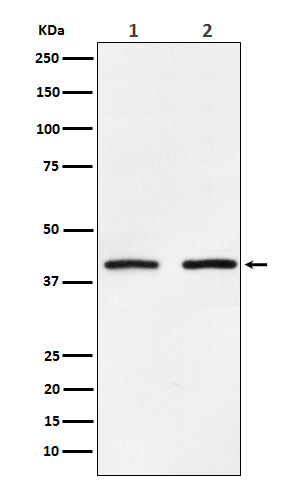
| WB | 1/500-1/1000 | Human,Mouse,Rat |
| IF | 1/20 | Human,Mouse,Rat |
| IHC | 1/50-1/100 | Human,Mouse,Rat |
| ICC | 1/50-1/200 | Human,Mouse,Rat |
| FCM | 1/50-1/100 | Human,Mouse,Rat |
| Elisa | 咨询技术 | Human,Mouse,Rat |
| Aliases | KMT3E; ZMYND1; ZNFN3A1; bA74P14.1 |
| Entrez GeneID | 64754 |
| WB Predicted band size | Calculated MW: 49 kDa; Observed MW: 42 kDa |
| Host/Isotype | Rabbit IgG |
| Antibody Type | Primary antibody |
| Storage | Store at 4°C short term. Aliquot and store at -20°C long term. Avoid freeze/thaw cycles. |
| Species Reactivity | Human,Mouse,Rat |
| Immunogen | A synthesized peptide derived from human SMYD3 |
| Formulation | Purified antibody in PBS with 0.05% sodium azide. |
+ +
以下是关于SMYD3抗体的3篇代表性文献(信息基于已发表研究总结,具体引用时请核对原文):
---
1. **文献名称**:*SMYD3 promotes cancer cell proliferation by regulating ERK phosphorylation via PP2A/C subunit interaction*
**作者**:Liu Y, et al.
**摘要**:研究利用SMYD3抗体通过免疫印迹和免疫组化技术,发现SMYD3通过结合蛋白磷酸酶PP2A的催化亚基,调控ERK信号通路,促进结直肠癌细胞增殖。
---
2. **文献名称**:*SMYD3 overexpression is a prognostic marker in hepatocellular carcinoma and drives oncogenic pathways*
**作者**:Hamamoto R, et al.
**摘要**:作者通过SMYD3抗体进行组织芯片分析,证明SMYD3在肝癌中高表达且与患者不良预后相关,机制上通过甲基化修饰MAP3K2蛋白激活RAS-MAPK通路。
---
3. **文献名称**:*Development of a monoclonal antibody against SMYD3 for targeted cancer therapy*
**作者**:Zhang X, et al.
**摘要**:研究报道了一种新型SMYD3单克隆抗体的开发与验证,该抗体可特异性抑制SMYD3的甲基转移酶活性,并在胰腺癌小鼠模型中显著抑制肿瘤生长。
---
如需具体文献来源,建议在PubMed或Google Scholar中搜索上述作者及关键词获取原文。
SMYD3 (SET and MYND domain-containing protein 3) is a lysine methyltransferase involved in epigenetic regulation, primarily catalyzing the methylation of histone H3 lysine 4 (H3K4) and H4 lysine 5 (H4K5) to modulate gene expression. It plays critical roles in cell proliferation, differentiation, and oncogenesis, with elevated SMYD3 expression linked to various cancers, including hepatocellular carcinoma, colorectal cancer, and breast cancer. SMYD3 interacts with RNA polymerase II and heat shock proteins, influencing transcriptional activation and stress response pathways. Its oncogenic potential is attributed to its ability to methylate both histone and non-histone substrates, promoting tumor growth, metastasis, and therapy resistance.
SMYD3 antibodies are essential tools for studying its expression, localization, and functional mechanisms. These antibodies are widely used in techniques like Western blotting, immunohistochemistry (IHC), and chromatin immunoprecipitation (ChIP) to detect SMYD3 levels in tissues or cell lines. Researchers also employ SMYD3-specific antibodies to explore its interactions with binding partners or assess its role in disease progression. Commercially available antibodies are typically raised against epitopes in the N-terminal or catalytic SET domain, with validation in knockout models ensuring specificity. However, challenges remain in distinguishing SMYD3 from homologous family members (e.g., SMYD2) due to structural similarities. Current studies focus on developing therapeutic strategies targeting SMYD3. underscoring the importance of reliable antibodies for preclinical research.
×